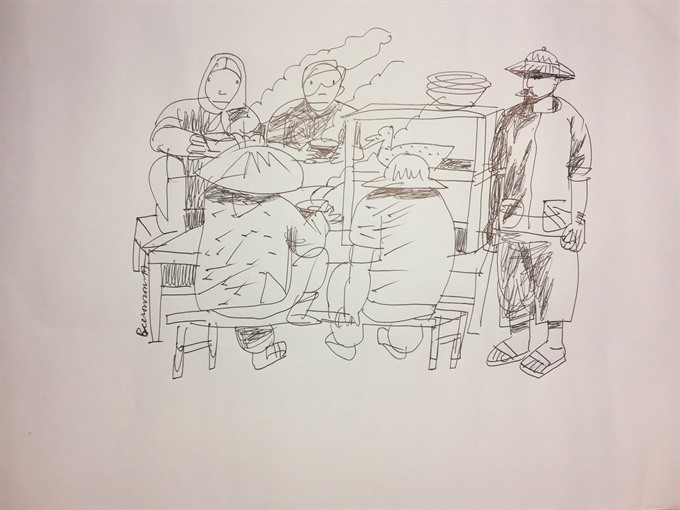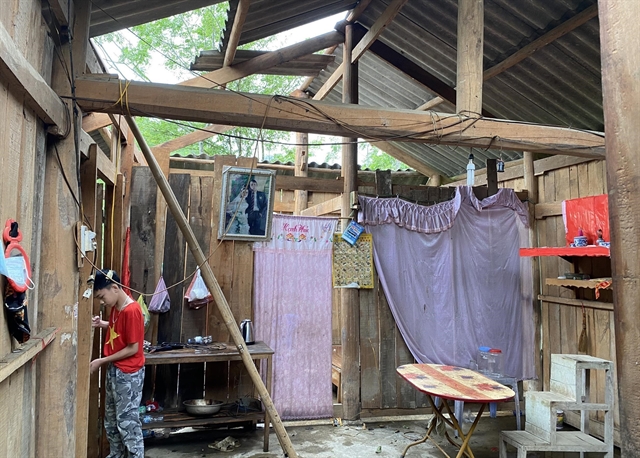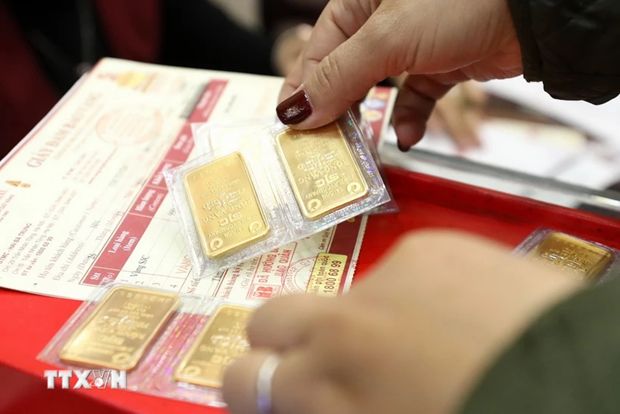

A short story by Lê Minh Nhựt
 |
by Lê Minh Nhựt
According to local practices, adead person’s coffin is laid in the middle of the house for five nights before being buried.On the first and second evenings, many neighbours and relatives pay homage to him. During the thirdand fourthdays, fewer visitors come and on the last, there isalmost none, except for a few standingvigil. They staylate playing cards, not for money, but to dispel thedreary atmosphere, along with a few drinks.Then deep at night, the host cooksgruelto fight their enemies;hunger and sleep.
The reason for my lengthy lead-inis Tư Ngàn, the deceased man inside a coffin laid in the centre of his house in his native hamlet. As the owner of a local restaurant, he served all the youths in the small area in memory of the April 30 Liberation Day. “Normally, I cook only duck gruel, but today I’veadded a chicken so you can all bury the hatchet, the war is over.”
* * *
I heard about hisbridge-building gruelfrom one of my school chums, an ex-resident of the hamlet. When I settled down there, Tư Ngàn’s grave was already covered with grass. New villas and apartments had shot up near the junction, except for one small piece of land where the old man’sgruel stall stood. The money for thenew buildings came from overseas Vietnamese, who used to wolf down his duck gruel. After he died, his children planned to sell his whole estate so they couldmove near the coast.They sold everything, apart from where his gruel stand used to be, due to a local rumours it was filled with rats, snakes and was a crack den.
My wife was a nervous woman. After sunset, she wouldn’t go outside partly because of that infamouspiece of land. One night she woke me up,crying horribly, “Darling, somebody is cooking gruel with fried onions. It’smaking me gag, I hate gagging in bed!”Another night, staring through the window, she begged me, “Go to that restaurant and get me a bowl of gruel. I’m craving it like a monkey craves bananas!”
Usually, no vehicleswent past that frightful place.
Sometimes, I thought I heard the clangs of cutlery coming from it. Once I heard a raucous voice, “Some more spices, spicy lady?”
The café we owned often closed late. I had to stay up lateinstead of my nervous wife most nights.I was a little afraid ofthat ghostly silence in pitch-black nights. I tried to convince myself, “Ghosts are also humans after death. Between ghost and man, which isworse?”
One rainy night after a longdayI was drifting asleep on the hammock, the football I was watching was heading to extra time and I was about to go to sleep when a taxi stopped abruptly in front of my cafe and aman walked in.
“An iced coffee, please,” he told me after taking a seat and putting his feet on the table. “Hurry up or else I’ll fall asleep.”
His voice and behaviour told me he was a bit of an eccentric. Looking at him carefully I saw many wrinkles on his forehead below his blackened hair.
“How’s business then young fella?” he asked me aggressively when I gave him his drink.
“Not too bad, old fella; especially on rainy days like this.” I took a seat beside him.
“Such is life grasshopper! Don’t worry too much, or else you’ll fall ill one day,” he said. “Life takes care of itself. When I moved abroad to the USA, I found my life almost unbearable at first. Yet, thanks to God’s blessings, everything turned out fine.” He leant back in his chair and lit a cigarette. His big goldy-lookingchain around his neck made him look smug to me.However, I was accustomed to men like him.
“So were you born here?” I asked him politely.
“Actually, this place used to be my home. Forty years has elapsed. Now that I’m American, I take pride in my new citizenship. However, some things from the past stay with you, like the tattoos on my arms.” He rolled up his sleeves and I could see some words, blurredby the passing years. “My glorious feats of arms in the 4th military zone.”
“I was born and bred here. Now you know what sort of man I am,” he said, staring squarely into my eyes.
“So you’re revisiting your birthplace?” I blurted out. “Do you have any relative still living here?” I changed the subject abruptly to make the air more comfortable.
“None, to my knowledge. I dropped into this cafeby chance. In fact, there’s nothing of minehere,” he drew up the corner of his mouth then looked at the TV. “Both the past and the future;worries about both should be put asideso we can live in the present,” he expressed his sentiments towardshis birthplace. “Hmm, extra-time in this match is about to begin.I wish that I could be one of the players. During the entire game he thinks of nothing else, but the ball,” he went on sadly. “I bet you five dollars the French team wins,” he said, putting a US $5 bill in the middle of the coffee table. I nodded in agreement and I won the bet. He also generously paid five more dollars for his coffee before leaving in search of a snack.
“You’ll do well to find food here at this time of night geezer,” I told him.
He smiled and stepped into the dark.
I locked the door and went to bed. When I woke up, the clock had already struck nine.Ifound several customers already drinking coffee in the cafe. They seemed to bedeep in conversation. Looking outside, I saw a large crowd making a fuss in front of the old duck gruel spot. Among them were a few policemen, going to and fro interviewing onlookers, old and young alike.
“Youhave to stay here,” said my wife when she saw that I was about to join the crowd outside. At once she drove me back.Regretfully, it was too late. A police officer was approaching me.
“I’ve been waiting for you for hours,” he told me. “I want to get some information about the dead man lying over there. I was told that last night he went to your cafe,” he said hurriedly.
“Wow, I hope I’m nota suspect,” I said to him nervously.
“Don’t worry. According to a doctor’s initial diagnosis, he died of a heart attack during the night. To the best of our knowledge, you’re thelast person to have seen him before he died. I expect you can tell me something about his relatives,” he said calmly. I heaved a sigh. I told him what I knewabout him and what we had done, except for the gambling.
It turned out that at five o’clock in the morning, a jogger found himdying near the piece of waste land, repeating his last words, “Mr Tư Ngàn’s gruel tastesvery delicious. It’smy favourite dish.”
Using his ID card, the police found one of his relatives living near the junction, who was willingto bury him. In the funeral procession, some more kin of his in the hamlet said that the deceased man had been the leader of a company of regional guards formerly stationed in the locality. He was the only one who had refused to eat the bridge-building gruel cooked by old Tư Ngàn.
Thanks to thatfuneral I learned there hadn’t been enough gruel for the dead man. If onlyanother portion had been cooked.
Paradoxically, out ofmy customer’s misfortune there was also a stroke of luck. My better half never smelledfried onion, or got a late night hankering for gruel.
What’s more, that plot of waste land finally fetched a great sum of money from a wealthy buyer, its reputation seemingly irrelevant.
Translated by Văn Minh









